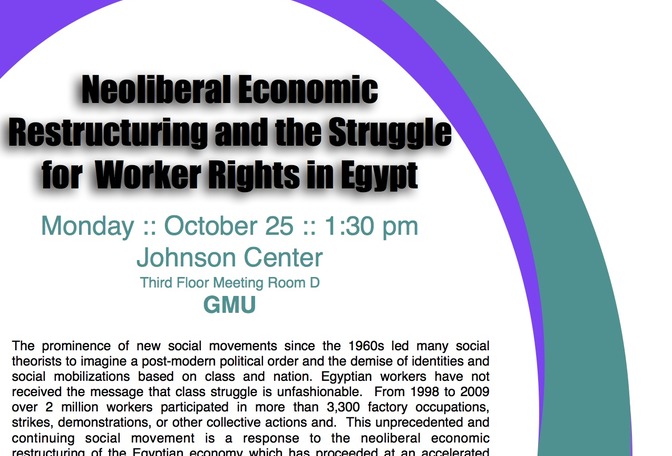- FAMA
- Researchers
-
Projects
- MESPI
- Knowledge Production Project >
-
Political Economy Project
>
- Development and the Uprisings
- Class Formations and Dynamics
- The Palestinian Economy: Fragmentation and Colonization
- Tunisia: A Political Economy in Transition
- Migrant States, Mobile Economies: Rethinking the Political in Contemporary Turkey
- Political Economy of the Middle East: Continuities & Discontinuities in Teaching & Research
- 2016 Political Economy Institute
- The Lebanon Project >
- The Palestine Project >
- The Civil Society Project >
- Middle East Media Project >
- The Egypt Project >
- Refugees and Migrants Project >
- Black-Palestinian Transnational Solidarities Project
- Initiatives
- Events
- Summer Institutes
- Internships
- Blog
|
October 25, 2010 @ 1:30pm
Johnson Center, Room D George Mason University Fairfax, Virginia Sponsored by the Middle East Studies Program, the Ali Vural Ak Center for Global Islamic Studies, and the MEtc Film Club. Featuring... Joel Beinin The prominence of new social movements since the 1960s led many social theorists to imagine a post-modern political order and the demise of identities and social mobilizations based on class and nation. Egyptian workers have not received the message that class struggle is unfashionable. From 1998 to 2009 over 2 million workers participated in more than 3,300 factory occupations, strikes, demonstrations, or other collective actions and. This unprecedented and continuing social movement is a response to the neoliberal economic restructuring of the Egyptian economy which has proceeded at an accelerated pace since the July 2004 installation of the government of Prime Minister Ahmad Nazif. Joel Beinin is the Donald J. McLachlan Professor of History and Professor of Middle East History at Stanford University. From 2006 to 2008 he served as Director of Middle East Studies and Professor of History at the American University in Cairo. In 2001-02 he served as president of the Middle East Studies Association of North America. He is the author of The Struggle for Worker Rights in Egypt (Solidarity Center, 2010); and Workers and Peasants in the Modern Middle East (Cambridge University Press, 2001). He received his Ph.D. from the University of Michigan in 1982, his M.A. from Harvard University in 1974, and his B.A. from Princeton University in 1970.
0 Comments
Leave a Reply. |
Forum on Muslim and Arab AffairsFAMA is the research arm of the Arab Studies Institute. Archives
June 2017
Categories |
- FAMA
- Researchers
-
Projects
- MESPI
- Knowledge Production Project >
-
Political Economy Project
>
- Development and the Uprisings
- Class Formations and Dynamics
- The Palestinian Economy: Fragmentation and Colonization
- Tunisia: A Political Economy in Transition
- Migrant States, Mobile Economies: Rethinking the Political in Contemporary Turkey
- Political Economy of the Middle East: Continuities & Discontinuities in Teaching & Research
- 2016 Political Economy Institute
- The Lebanon Project >
- The Palestine Project >
- The Civil Society Project >
- Middle East Media Project >
- The Egypt Project >
- Refugees and Migrants Project >
- Black-Palestinian Transnational Solidarities Project
- Initiatives
- Events
- Summer Institutes
- Internships
- Blog


 RSS Feed
RSS Feed
